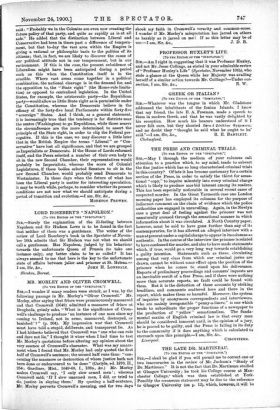THE PRESS AND CRIMINAL TRIALS.
[TO THE EDITOR OP THE "SPECTATOR."]
SIR,—May I through the medium of your columns call attention to a practice which, to my mind, tends to subvert the fine justice which has so long characterised criminal trials in this country? Of late it has become customary for a certain section of the Press, in order to satisfy the thirst for sensa- tional "Copy," to inquire minutely into every criminal charge which is likely to produce morbid interest among its readers. This has been especially noticeable in several recent cases of suspected murder. In the Great Yarmouth case one London morning paper has employed its columns for the purpose of indiscreet comment on the chain of evidence which the police authorities are engaged in unravelling. Again, in the Newlyn case a great deal of feeling against the prisoner was not unnaturally aroused through the sensational manner in which information about it was circulated. A North Country paper, however, must be said to have gone further than any of its contemporaries, for it has allowed an alleged interview with a man at present under a capital charge to appear in its columns as authentic. In the course of the interview the prisoner is related to have confessed the murder, and also to have made statements which, if true, would go a very long way towards establishing a guilty intention. Statements such as these, circulating among that very class from which our criminal juries are drawn, cannot be without some effect upon the position of the prisoner when he comes to stand upon his deliverance. Reports of preliminary proceedings and coroners' inquests are an inevitable result of a free Press, and if there were nothing more than accurate reports, no fault could be found with them. But it is the distortion of these accounts by striking headlines, and comments scattered here and there in the report, which makes them so harmful. Moreover, the system of inquiries by anonymous correspondents and interviewers, who are mainly irresponsible " penny-a-liners," is one which tends to subordinate the proper functions of a newspaper to the production of " yellow " sensationalism. The funda- mental maxim of English criminal law is that every man should be considered innocent until, in the opinion of a jury, he is proved to be guilty, and the Press is failing in its duty to the community if it does anything which is calculated to encroach upon this principle.—I am, Sir, &c..
Liverpool. CIRCITITEER.










































 Previous page
Previous page